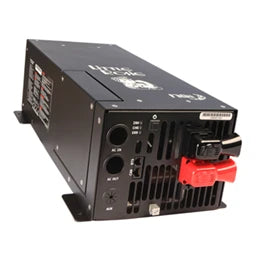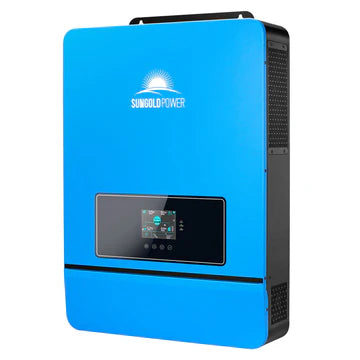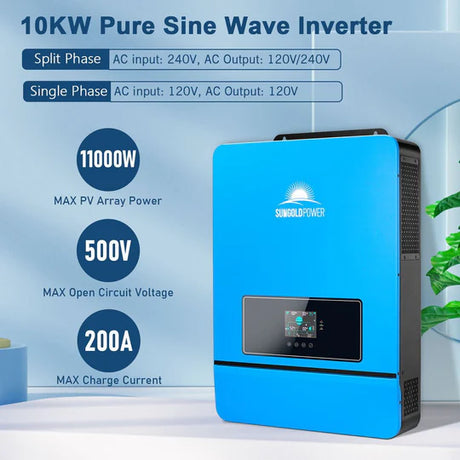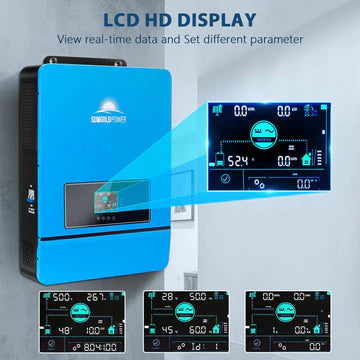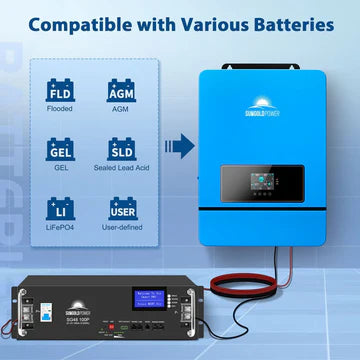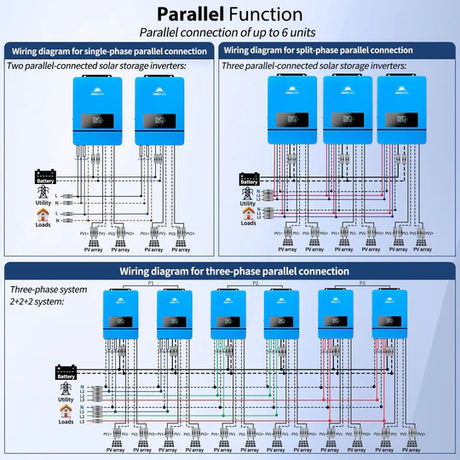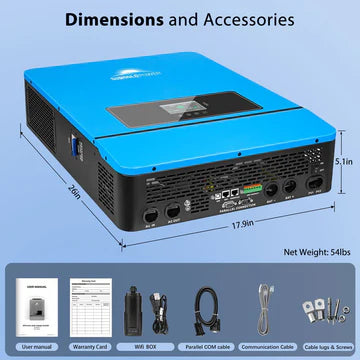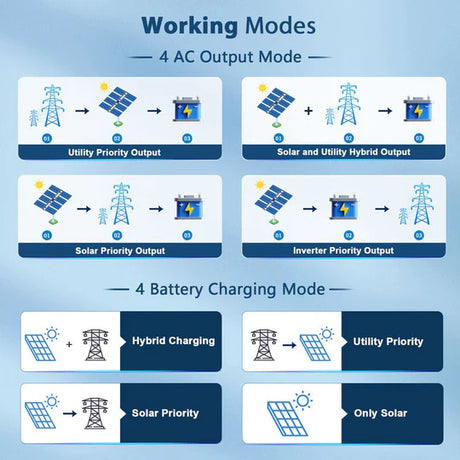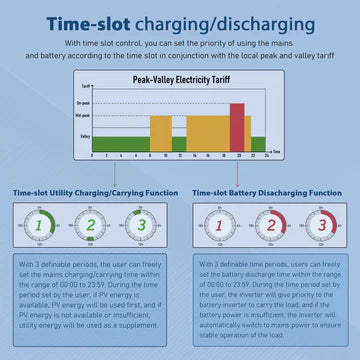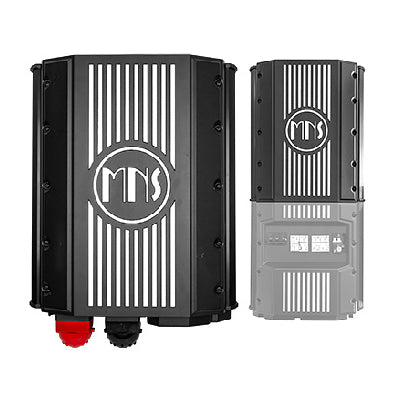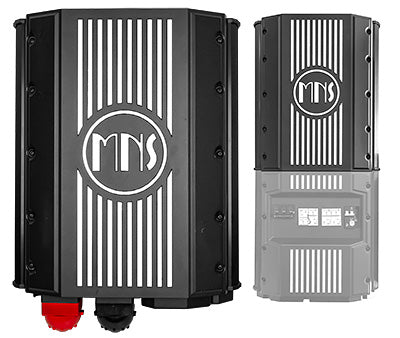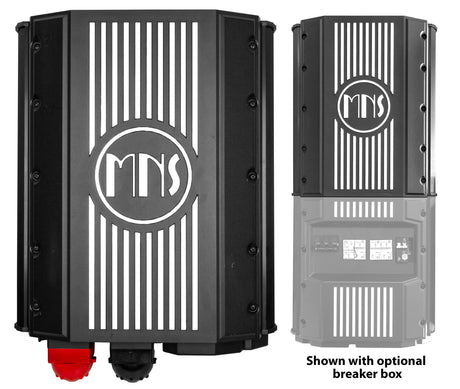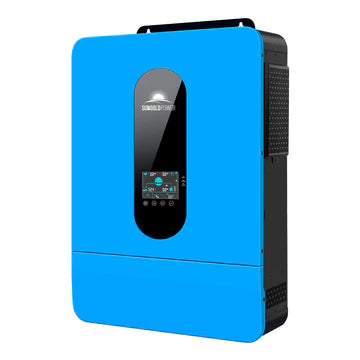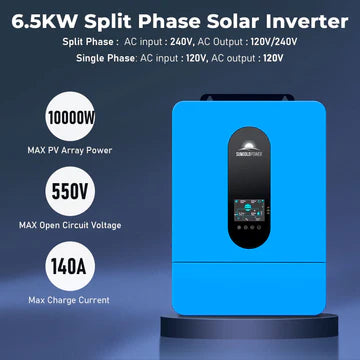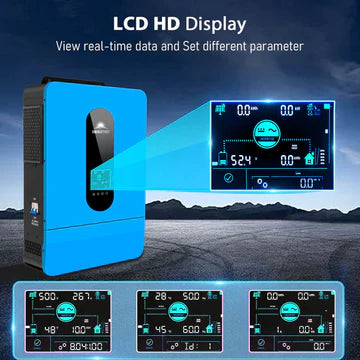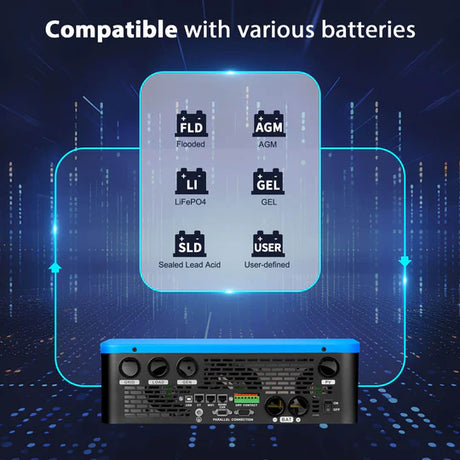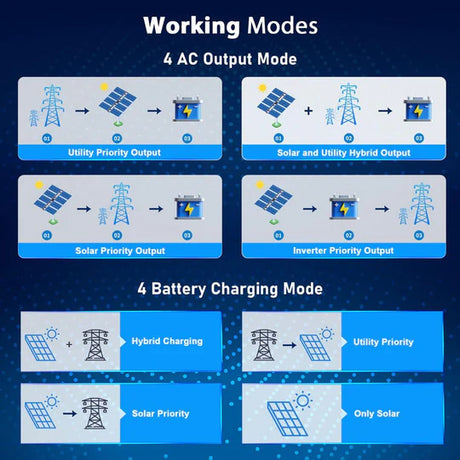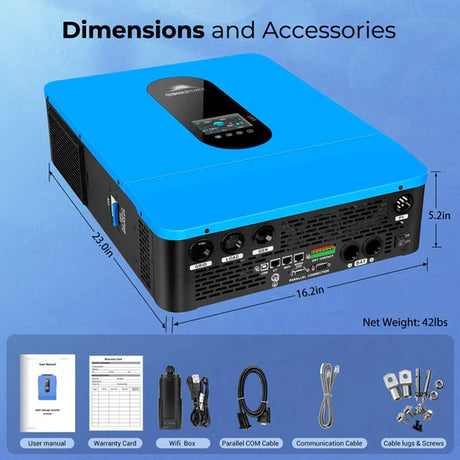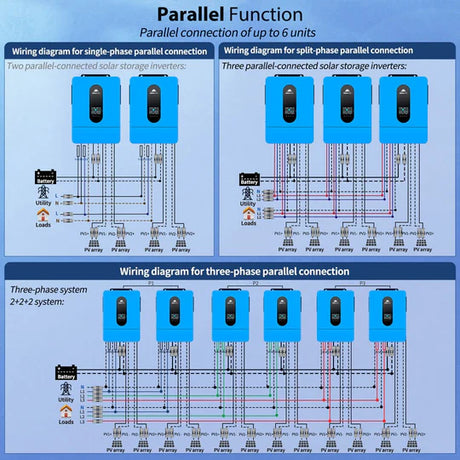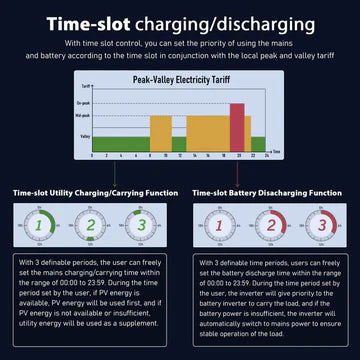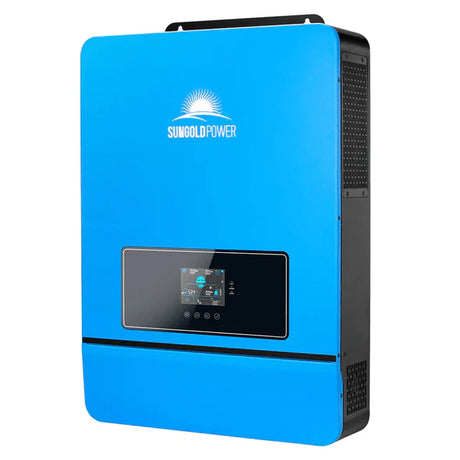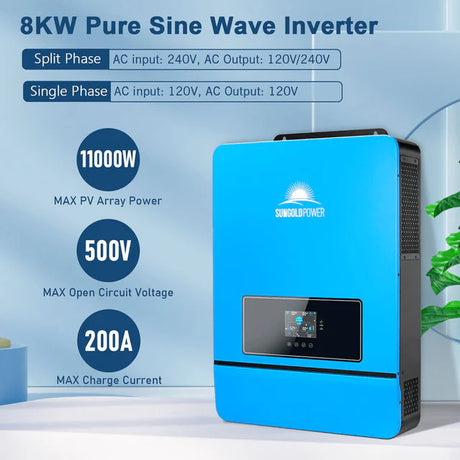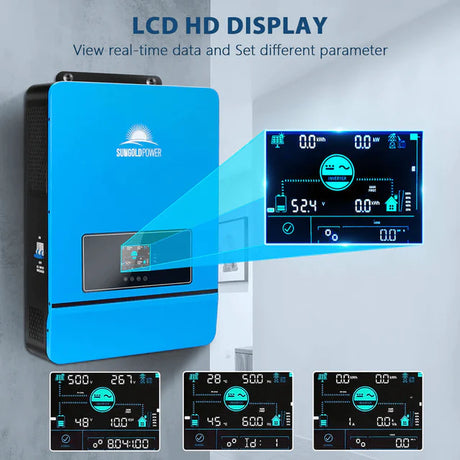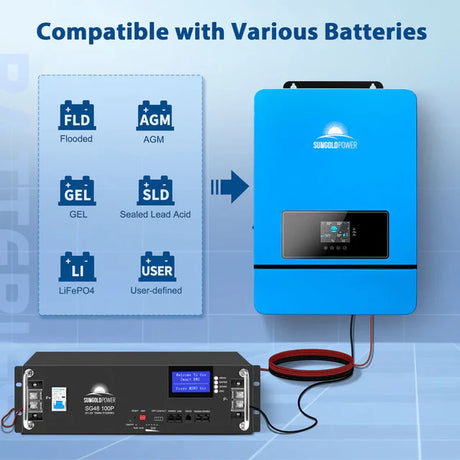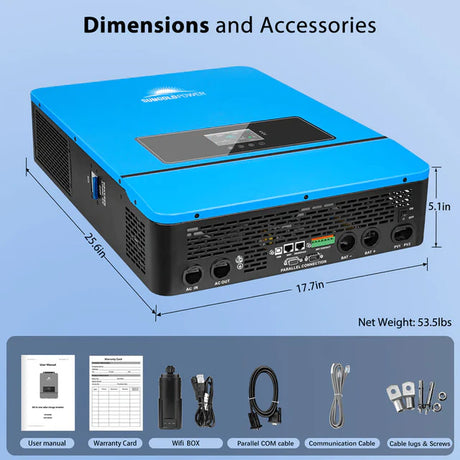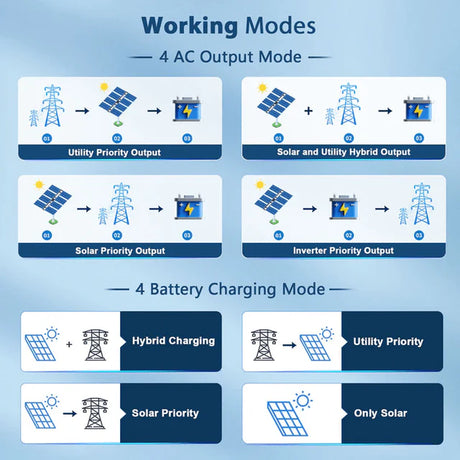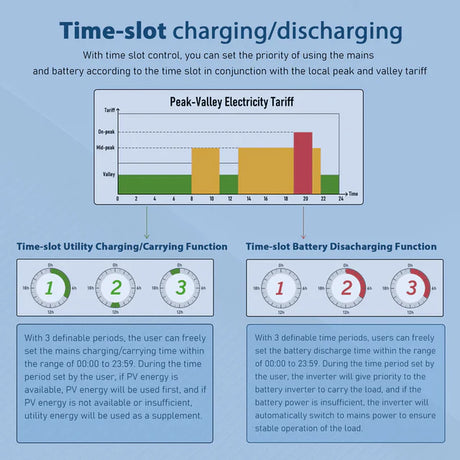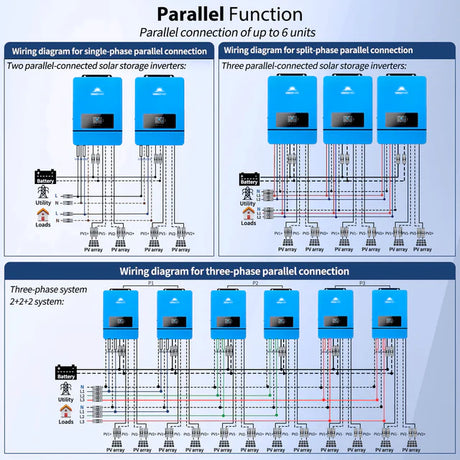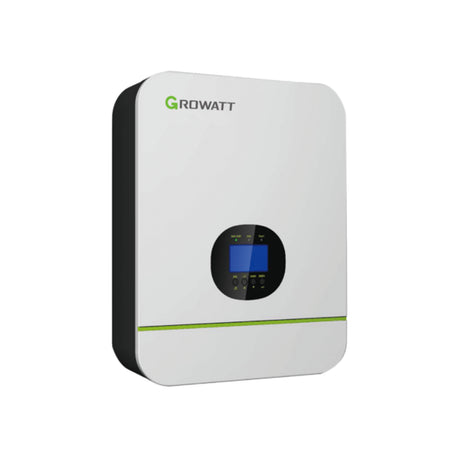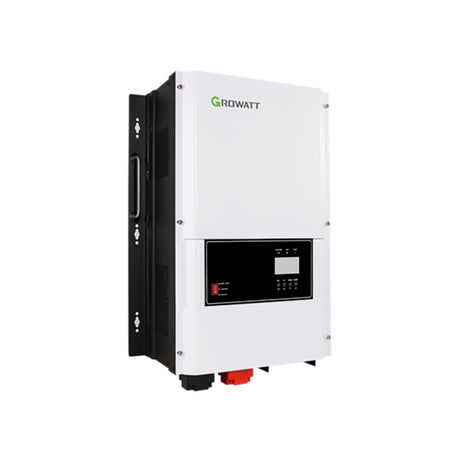Midnite Solar
$1,699.00$2,320.00Unit price /Unavailable- 15% off
SunGold
SunGold Power 10KW 48V Split Phase Solar Inverter
$1,690.00$1,980.00Unit price /Unavailable - 25% off
Midnite Solar
Midnite Solar Rosie Inverter | 7000W Output | 48V 120/240V Split Phase | American Made
$3,262.50$4,350.00Unit price /Unavailable - 11% off
- 13% off
SunGold
SunGold Power 8KW 48V Split Phase Solar Inverter
$1,550.00$1,790.00Unit price /Unavailable Growatt
Growatt 3kW Stackable Off-Grid Inverter | SPF 3000TL LVM-48P
$749.99$999.99Unit price /UnavailableGrowatt
Growatt 12kW Split Phase Off-Grid Inverter UL 1741 Certified | SPF 12000T DVM-US MPV
$2,399.00$2,599.00Unit price /Unavailable
What Is an Off-Grid Solar Inverter?
An off-grid solar inverter is a device that converts DC power from solar panels or batteries into usable AC electricity. Unlike grid-tied or hybrid solar systems, these units don't have any connection to the utility grid, providing continuous power 24/7. Therefore, off-grid solar inverters form the heart of a self-sufficient energy system.
They automatically manage the flow of solar energy, battery charging, and power delivery. This makes them perfect for areas without access to public power lines, such as remote cabins, RVs, and rural homes.
How Off-Grid Solar Inverters Work
Off-grid inverters perform multiple critical functions simultaneously. During daylight, they convert DC electricity from your solar panels into AC power for immediate use. At the same time, these devices direct excess energy to charge your battery bank. When the sun sets or during cloudy periods, the inverter switches to battery power, ensuring an uninterrupted electricity supply.
Modern units feature advanced MPPT charge controllers that maximize solar harvest by up to 25-30%, while sophisticated battery management systems prevent overcharging and deep discharge. This smart technology makes today's off-grid solar setup more efficient and reliable than ever before.
Top Features of a Quality Off-Grid Solar Inverter
Certain features separate premium from basic models. There are several top features you should look for in an off-grid solar inverter, including:
- Pure sine wave output. Professional-grade inverters deliver clean, stable power identical to utility electricity, protecting sensitive electronics and ensuring all appliances run smoothly without interference or damage.
- Split-phase capability. Advanced models offer 120/240V split-phase output, powering everything from small electronics to heavy-duty appliances like well pumps and air conditioners.
- Smart battery management. Integrated charging systems optimize battery life with multi-stage charging profiles, temperature compensation, and customizable settings for different battery types.
- Remote monitoring. Stay connected to your home’s off-grid solar system with WiFi-enabled monitoring which allows real-time performance tracking and system adjustments from anywhere.
- Surge protection. Built-in surge capacity handles startup loads from motors and compressors, typically providing 2-3 times the continuous rating for reliable appliance operation.
Benefits of Off-Grid Solar Inverters
Off-grid solar inverters offer more than just independence from the utility grid. They enhance energy security and ensure continuous power in any location. Let’s examine each benefit in more detail.
1. True Energy Independence
With a complete off-grid solar kit, you’re in control of your power source. No more monthly bills, rate increases, or power company restrictions. An off-grid solar inverter generates, stores, and manages your own clean energy, providing complete autonomy whether you're in a remote location or simply choosing self-sufficiency.
2. Backup Power During Outages
While grid-tied households lose power during storms or outages, your off-grid solar power backup keeps running smoothly. These systems automatically switch to battery power in milliseconds, ensuring your lights stay on, refrigerators keep running, and critical systems remain operational without interruption.
3. High Efficiency & Smart Management
Modern inverters achieve up to 96% efficiency, maximizing every watt your panels produce. Intelligent load management prioritizes essential circuits during low-battery situations, while programmable settings optimize performance for your specific needs and usage patterns.
4. Scalable & Modular Design
Quality off-grid inverters allow parallel operation, meaning you can add units as your energy needs grow. This flexibility makes them perfect for everything from small cabin installations to full residential off-grid solar power systems.
How to Choose the Right Off-Grid Solar Inverter
Choosing the right inverter requires matching your specific needs with the right specifications. First, calculate your peak power requirements by adding up all appliances you'll run simultaneously, then add 20-30% for surge capacity. Also, check your battery bank voltage (12V, 24V, or 48V systems) for compatibility, and evaluate your solar array size to confirm the inverter's charging capacity can handle your panel output.
Look for models with comprehensive warranties from established brands and consider future expansion. By choosing an inverter that supports parallel operation, you have the flexibility to add more solar panels as your needs evolve. Lastly, verify certification compliance for your area and confirm the unit includes essential safety features like ground fault protection and arc fault detection.
Off-Grid Solar Inverters FAQ
1. Can off-grid inverters work without batteries?
No, off-grid inverters require batteries to function properly. Unlike grid-tied systems, they need battery storage to provide power when solar production is insufficient, such as at night or in bad weather. The battery bank acts as your personal power reservoir.
2. Can I run a whole house on off-grid solar?
Yes, with proper system sizing, you can power an entire home off-grid. Most households require 5-10kW inverter capacity with 20-40kWh battery storage, though energy-efficient homes may need less. With professional system design, you ensure reliable whole-home power.
3. What's the difference between off-grid and hybrid solar inverters?
Off-grid inverters work completely independently without a grid connection, while hybrid inverters can operate both off-grid and grid-tied. With hybrid systems, you can use grid power as backup while maintaining battery storage for outages.

